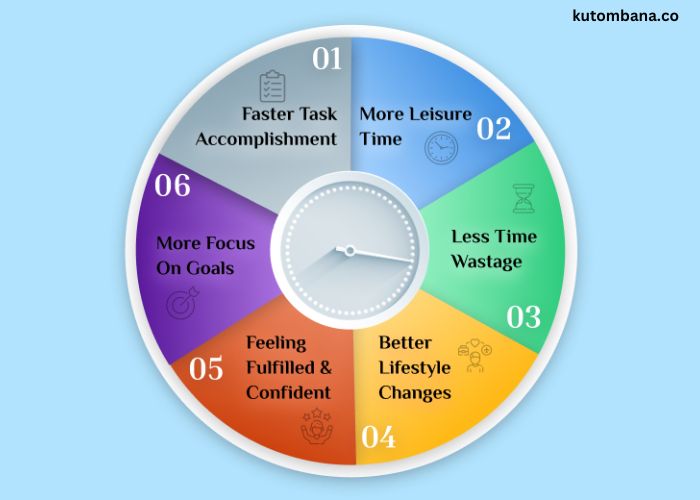Time is one of the most valuable resources we have, yet many struggle to manage it effectively. Proper time management allows you to be more productive, reduce stress, and create a balanced lifestyle. Whether you’re a student, professional, entrepreneur, or stay-at-home parent, mastering time management can enhance your quality of life. This article explores practical time management tips that can help you make the most of your day and achieve a healthier, more fulfilling lifestyle.
The Importance of Time Management
Effective time management is crucial for achieving personal and professional goals. It helps in:
- Increasing Productivity: Organized tasks lead to higher efficiency and better results.
- Reducing Stress: A well-planned schedule eliminates last-minute rushes and panic.
- Improving Work-Life Balance: Allocating time effectively allows you to enjoy both personal and professional life.
- Enhancing Decision-Making: Prioritization and planning reduce confusion and improve decision-making skills.
Top Time Management Tips for a Better Lifestyle
1. Set Clear Goals
Having clear goals provides direction and motivation. Use the SMART criteria to define your goals:
- Specific: Define what you want to accomplish.
- Measurable: Establish criteria to track progress.
- Achievable: Set realistic goals.
- Relevant: Ensure the goal aligns with your broader objectives.
- Time-bound: Assign a deadline to keep yourself accountable.
2. Prioritize Tasks Effectively
Not all tasks are equally important. Use the Eisenhower Matrix to categorize and prioritize tasks:
- Urgent & Important: Do immediately.
- Important but Not Urgent: Schedule for later.
- Urgent but Not Important: Delegate.
- Neither Urgent Nor Important: Eliminate.
3. Create a Daily To-Do List
Writing down tasks helps you stay organized. Follow these guidelines:
- Keep the list short and realistic.
- Break larger tasks into smaller steps.
- Prioritize tasks using the ABCDE method:
- A: Most important.
- B: Important but not urgent.
- C: Nice to do but not necessary.
- D: Delegate.
- E: Eliminate.
4. Use Time Blocking Techniques
Time blocking involves scheduling specific time slots for tasks. To use this technique:
- Allocate specific hours for deep work, meetings, and breaks.
- Minimize multitasking to stay focused.
- Use the Pomodoro Technique (25-minute work sessions followed by 5-minute breaks) to maintain productivity.
5. Eliminate Distractions
Distractions waste time and lower efficiency. To reduce distractions:
- Turn off unnecessary notifications.
- Set boundaries with colleagues, friends, and family.
- Use website blockers to limit time on social media.
- Work in a clutter-free, quiet environment.
6. Learn to Say No
Many people struggle with time management because they overcommit. Learn to say no to tasks that do not align with your goals or priorities. Politely decline extra responsibilities that may overwhelm you.
7. Delegate Tasks Wisely
Delegating tasks helps save time and focus on more important responsibilities. To delegate effectively:
- Identify tasks that others can handle.
- Choose reliable individuals.
- Provide clear instructions and expectations.
- Trust the process and avoid micromanaging.
8. Leverage Technology for Productivity
Use technology to automate repetitive tasks and stay organized. Helpful tools include:
- Task Managers: Trello, Asana, or Todoist.
- Time Trackers: RescueTime, Toggl.
- Calendars: Google Calendar, Microsoft Outlook.
- Note-Taking Apps: Evernote, Notion.
9. Set Deadlines and Stick to Them
Deadlines create urgency and encourage focus. To meet deadlines:
- Set realistic due dates.
- Break projects into smaller deadlines.
- Reward yourself for meeting milestones.
10. Take Breaks to Maintain Productivity
Working non-stop leads to burnout. To maintain productivity:
- Take short breaks every 60–90 minutes.
- Step outside for fresh air or stretch.
- Engage in mindful activities like meditation or deep breathing.
11. Establish a Morning and Evening Routine
A structured morning routine sets the tone for the day, while an evening routine helps wind down.
- Morning Routine: Wake up early, exercise, plan your day.
- Evening Routine: Reflect on the day, set goals for tomorrow, unwind.
12. Avoid Multitasking
Multitasking reduces efficiency and increases errors. Instead:
- Focus on one task at a time.
- Complete tasks fully before moving on.
- Use focus techniques like the single-tasking method to improve concentration.
13. Plan Ahead for the Next Day
Before ending your day, take a few minutes to:
- Review what you accomplished.
- Plan the next day’s tasks and schedule.
- Prepare necessary materials to avoid morning rush.
14. Maintain a Healthy Work-Life Balance
Balancing work and personal life ensures long-term success. To achieve this:
- Set boundaries for work hours.
- Make time for hobbies and relaxation.
- Spend quality time with family and friends.
15. Continuously Evaluate and Adjust Your Time Management Strategies
Regularly assess what’s working and what’s not. Adjust your approach based on:
- Feedback from self-reflection.
- Productivity levels.
- Changing priorities and responsibilities.
Conclusion
Effective time management is the foundation of a better lifestyle. By setting clear goals, prioritizing tasks, eliminating distractions, and leveraging productivity techniques, you can make the most of your time. Implement these strategies to reduce stress, boost efficiency, and create a balanced, fulfilling life. Start today, and take control of your time for a brighter future!

